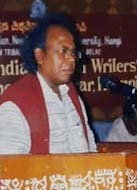
Musician, linguist, writer, scholar, educationist, institution-builder, tribal activist — and a key figure in creation of Jharkhand — Ram Dayal Munda passed away in Ranchi on September 30 at the age of 72. […]
Dr. Munda believed strongly that the Adivasis would survive only if their culture continued to flourish: Nachi se banchi (Dance to survive), he would say. Indeed, for him, the preservation of the tribal way of life, culture and languages was integral to his work of improving their lot, and fighting for their rights to the forest land they lived on. […]
Dr. Munda’s own life story was exemplary. Born in 1939, in the tribal village Diuri in Ranchi district, he attended the neighbourhood Luther Mission School at Amlesa: from there, he moved to the sub-divisional town of Khunti, 40 km away from home, to study at a secondary school there. As the centre of the historic Birsa movement, the area attracted international scholars, especially anthropologists. Dr. Munda found himself playing guide to such visitors, an experience that led him to an M.A. in anthropology at Ranchi University (1963), followed by a PhD on tribal languages at Chicago University (1970). After teaching stints at the universities of Chicago and Minnesota, he returned to Ranchi University to head the newly established Department of Tribal and Regional Languages, finally becoming its Vice-Chancellor in 1985.
Cultural mobilisation
In 1999, he retired from active teaching to concentrate on the cultural mobilisation of the Adivasis: this included active policymaking at the U.N. Working Group on Indigenous People in Geneva and the U.N. Forum of Indigenous Issues in New York, as a senior official of the Indian Confederation of Indigenous and Tribal Peoples (ICITP), an all India tribal-led and managed movement.
Dr. Munda will be particularly remembered for building a troupe of dancers and musicians, whether as a student in India or in the United States, or later when he was teaching at Ranchi University: he consistently sought to integrate traditional performance culture into modern-day life. His troupe led the Indian cultural contingent in the Festival of India in the USSR in 1987; in 1989, it toured the Philippines, China, and Japan. Thanks to his leadership, village akharas for dance and music were revived across Jharkhand.
In 2007, Dr. Munda was honoured by the Sangeet Natak Akademi; in 2010, he was awarded the Padma Shri.
It is his lifelong dedication and contribution to the cause of preserving tribal culture that will live on.
Source: “A life dedicated to preserving tribal culture” by Smita Gupta (The Hindu News / National, 3 October 2011)
Address : https://www.thehindu.com/news/national/article2506981.ece
Date Visited: Thu Nov 10 2011 19:15:09 GMT+0100 (CET)
For how long will I have to
Bear the pain of development
Or is it that I will be done to death
Before attaining development?
Ram Dayal Munda in “The Pain of Development” (Vikas Ka Dard) courtesy Dr. Ivy Hansdak >>
The discourse of Adivasiyat enables politics to be framed in terms of ownership of resources, rights and dignity. In this discourse, the Adivasi is the owner of the land rather than an imperfectly integrated cultural fragment. Hence, it links the story of the Adivasi with the global story of oppression and dispossession of indigenous populations at the hands of outsiders. It is in this context that the observance of such a past on World Indigenous Day assumes great ideological significance for the Adivasis. What is playing out in Madhya Pradesh is Developmentthat very struggle against the silent erasure of Adivasiyat.
Anshul Trivedi is a PhD candidate at the Centre for Political Studies, JNU. He tweets @anshultrivedi47
Source: “The silent erasure of Adivasiyat” by Anshul Trivedi (PhD candidate at the Centre for Political Studies, JNU), The Hindu, 4 December 2021
URL: https://www.thehindu.com/opinion/op-ed/the-silent-erasure-of-adivasiyat/article35842267.ece
Date Visited: 27 May 2022
“The issue is not whether the world’s economy is governable toward ambitious goals like promoting social justice, equality between countries and greater democratic control for the bulk of the world’s people, but whether it is governable at all.” – Mogobe B. Ramose quoting Globalization in question by Hirst, P. and Thompson, G in “Globalization and ubuntu” (The African Philosophy Reader), pp. 732 | Globalization >>
Up-to-date reports by Indian journalists and commentators
To search Indian periodicals, magazines, web portals and other sources safely, click here. To find an Indian PhD thesis on a particular tribal community, region and related issues, click here >>
Search tips
Combine the name of any particular state, language or region with that of any tribal (Adivasi) community.
Add keywords of special interest (music, poetry, dance just as health, sacred grove and biodiversity); learn about the rights of Scheduled Tribes such as the “Forest Rights Act” (FRA); and the United Nations “Declaration on the Rights of Indigenous Peoples”, “Universal Declaration of Human Rights”, “women’s rights”, or “children’s right to education”.
Specify any other issue or news item you want to learn more about (biodiversity, bonded labour and human trafficking, climate change, ecology, economic development, ethnobotany, ethnomedicine, global warming, hunter-gatherers in a particular region or state, prevention of rural poverty, water access).
For official figures include “scheduled tribe ST” along with a union state or region: e.g. “Chhattisgarh ST community”, “Himalayan tribe”, “Scheduled tribe Tamil Nadu census”, “ST Kerala census”, “Particularly Vulnerable Tribal Group Jharkhand”, “PVTG Rajasthan”, “Adivasi ST Kerala”, “Adibasi ST West Bengal” etc.
In case the Google Custom Search window is not displayed here try the following: (1) toggle between “Reader” and regular viewing; (2) in your browser’s Security settings select “Enable JavaScript” | More tips >>
Note: hyperlinks and quotes are meant for fact-checking and information purposes only | Disclaimer >>
Learn more
Childhood | Childrens rights: UNICEF India | Safe search
Crafts and visual arts | Masks
Education and literacy | Right to education
eBook | Adivasi Stories from Gujarat
eBook | “Where the mind is without fear”: Tagore, Gitanjali and the Nobel Prize
Literature and bibliographies | Literature – fiction | Poetry